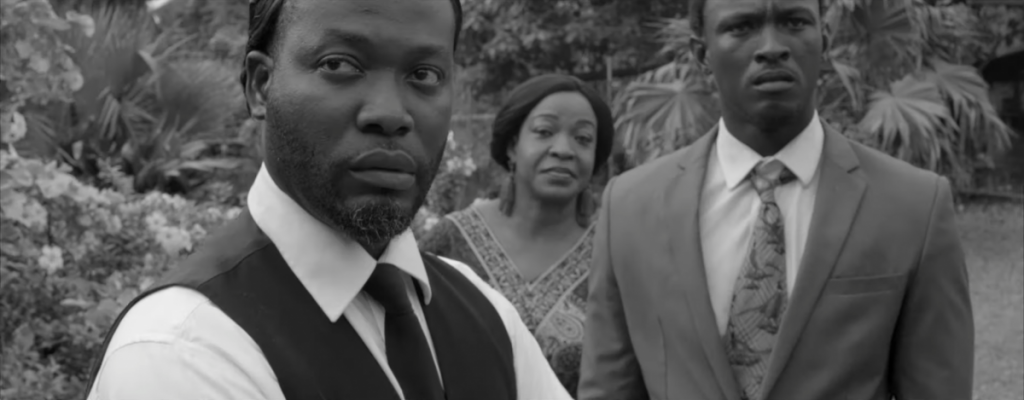It’s 1969, years since the West African country of Ghana gained its independence from Britain. It’s an event buried in the annals if history and not all that familiar if you’re not the most keen on world history, and it serves all the more interesting as far as storytelling templates go with actor and filmmaker Pascal Aka’s latest, Gold Coast Lounge.
The typical upheaval that comes with the changing of times is on blaring display here, along with the film’s titular bar and lounge right in the heart of the city of Accra. Business is booming, the customers are happy, and everything is in place, more or less. At the center of it all is Daniel (Alphonse Menyo), bodyguard, enforcer and the right-hand man to the lounge’s president and co-founder, the currently incarcerated John Donkor (Adjetey Anang).
Save for his usual respite moments of escape in the form of his favorite chocolate cake, he does what he can to maintain some semblance of law and order, particularly among the lounge’s current employment. He’s forced to constantly watch over the illegal activities by Donkor’s daughter, Akatua (Zynnell Zuh), as well as his own brother-in-arms, Wisdom (Pascal Aka).
Little does anyone know that the lounge is well on its way to becoming epicenter of a world shaken by much more than its newly-elected government. The announcement of Donkor’s return from jail following a six-month prison sentence due to the club’s history of criminal activity puts the lounge in a bind with word from Inspector Mu Ti (Fred Amugi) that the club has three weeks to shapen up and prove itself as a viable tourist attraction without getting its hands dirty.
Things take a huge twist when Donkor’s efforts to audition a beautiful star singer for the club result in the arrival of Daniel’s childhood love interest, Naa Adorley (Raquel Ammah), who goes by the name, Rose. Just as Donkor manages to find himself back in the groove of things, he is poisoned and pronounced dead moments later, triggering a momentary panic among the lounge hierarchy that ultimately finds Daniel taking Donkor’s place as the rightful successor.
The remainder of Aka’s Gold Coast Lounge spawns more prototypically with nods to the likes of Homer or Alexandre Dumas, and gets a little more Shakespearean with each act. These serve as the backbone for the film’s strong cast performances and plot development, all of which thrive on Aka’s particular use of story forumla, lending an air of freshness to the often jovial, musical façade that veils the film’s intense, omnious air.
This, coupled with the film’s overall setting, adds to the minatory tone that looms with the all too familiar affects colonization and impending industrialization has on a third-world country and the urgency of industry to advance with the rest of the world. We see sprinkles of this, ensuing the effective complexity of our characters, specifically with Daniel, in place of his given village name, Nii Lamptey, next to Rose’s Naa Adorley.
The conflict is even louder for Wisdom, whose own agenda has little to do with helping anyone other than himself, despite his own fear of acting alone and in the betterment of a greater cause. Underscoring it all is his bitter hatred for Daniel for being Donkor’s favorite; next to their shared ire in their differing ideals in which Daniel prefers to strengthen the lounge’s viability as an autonomous, Ghanian-run business, Wisdom chooses instead to displace any and all blame unto him for his failings, all in the course of making up for his own inferiority.
Of course, a story like Gold Coast Lounge welcomes a more ensemble game. Wisdom finds himself on common ground with Akatua who equally despises Daniel’s lofty enforcement of a cleaner slate, as much as its disrupted her own dirty cash flow. Her story arc takes a much more darker, menacing turn, and still, the biggest twist the film has to offer is yet to be revealed.
From the jovial millieu that sets the tone in the music and nightlife Mecca of the titular lounge, to the backroom seediness, treachery, jealousy, heartbreak and violence, Gold Coast Lounge culminates as an amply entertaining, if not brilliant, character experiment on archetypes, one with a compelling, cautionary window into the history of an African country that most in the western world are not at all familiar with. It’s a perfect canvas on which Aka applies his craft and certain peculiar mise-en-scène techniques between chapters, as well as the production of the film’s original score for actresses Ammah and Soul to apply their delightful vocals. The film’s opening credits sequence alone screams the work of someone who should be directing a 007 film at this point.
The pinpoint construction of the film’s general messaging speaks inherently to the existence of the lounge and all that spawns from it. You realize that in all its various and well-meaning auspices lies the byproduct of a man’s own greed and multiplying malfeasance, and the fortutiously tragic nature that mirrors all of those involved. The internal upheaval and tribalism, the conniving and underhanding of those on the opposite ends of it leadership and the disposing of casualities therein, are all central to the illusory prosperity of a criminal front that isn’t meant to last. The very crux of this underlying message gets a boost in one of the film’s key dialogue moments between the roles of Daniel and Ama: “…nobody wins in a civil war, except those who want our downfall”.
The afro-noir genre has more than a century of history to its credit with the likes of Sidney Poitier, Harry Belafonte and Pam Grier among numerous film laureates. With Gold Coast Lounge, Aka certainly contributes his art to the myriad enumeration of works recognized in this particular column, and deservedly puts Breakthrough Studios on a larger map provided it can get more screenings overseas.

